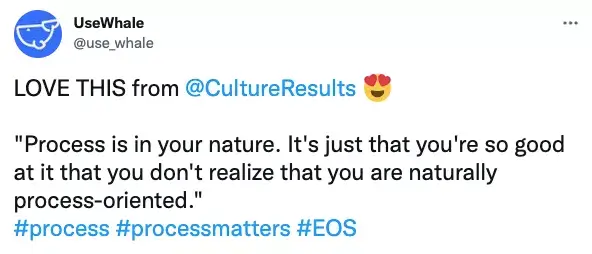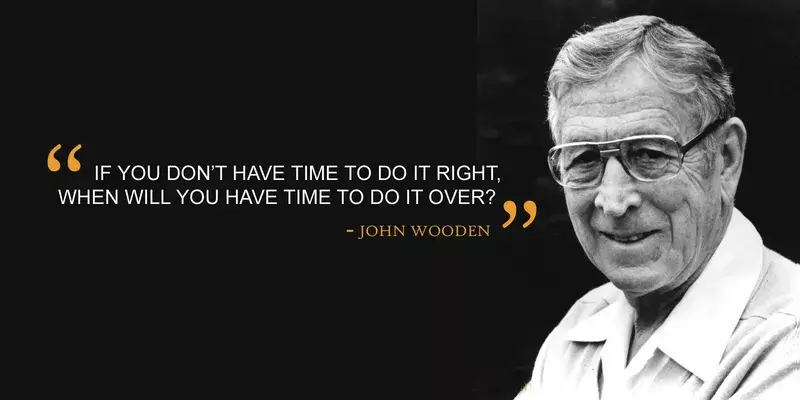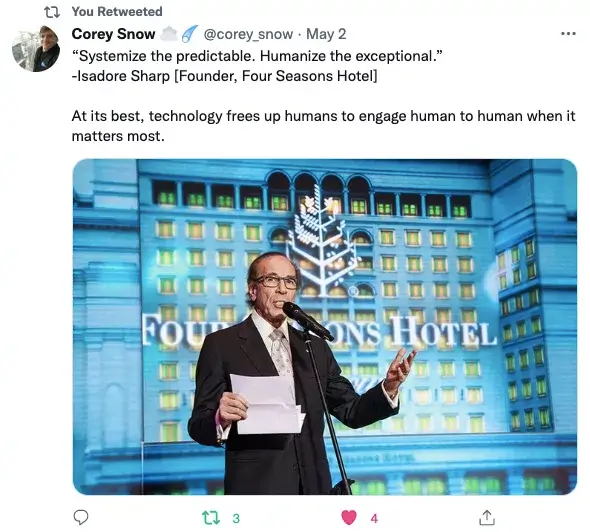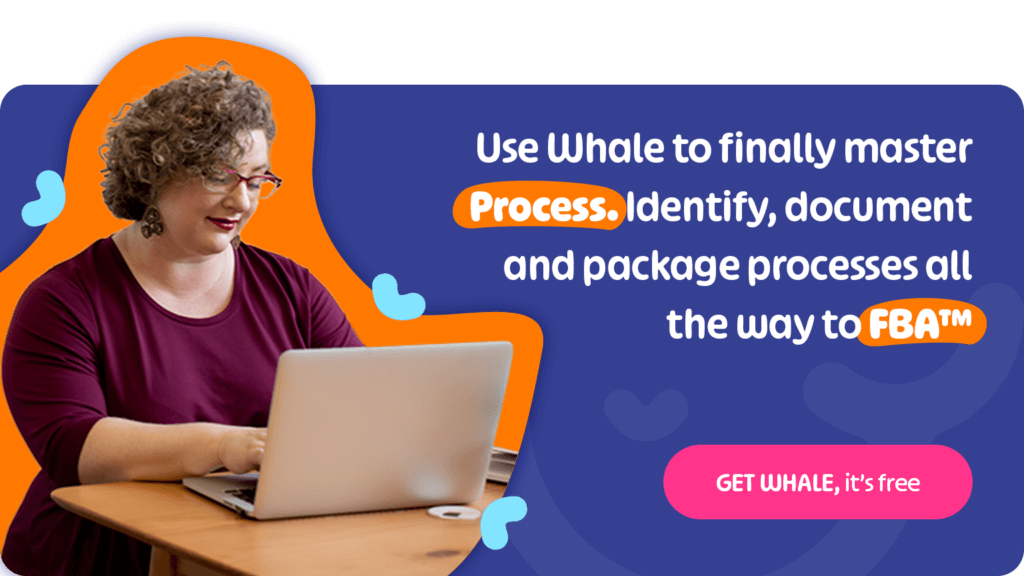What on earth is a process mindset?
Well, you’ve heard of the saying "Get your head in the game?"
It means "Pay attention" or "Focus on what you are doing."
But how can you focus in business if you’ve got three thousand things to do or are trying to put out fires in your business.
Yes, you can meditate and do exercise to start your day but as a leader you’re probably not going to get anywhere unless you create process and systemize your business to help you focus.
What it means to have a process mindset?
To understand more on what it means to have a process mindset, we spoke to Liza Gonzalez Author, Speaker and EOS ImplementerⓇ.
Lisa Gonzalez is no stranger to the world of entrepreneurship. Lisa grew up in an entrepreneurial family in California and supported them in their many business operations. With a wealth of entrepreneurial experience since then and as co-author of the book Process! we hosted Lisa on the Unlocking Growth Podcast to talk about the 3 mindsets that prevent process, and ultimately success.
What typical blocks do entrepreneurs have to developing a process mindset?
This is the reason myself and Mike Paton actually wrote the book Process!
We realized that as much as entrepreneurs want to lead more effective and rewarding professional and personal lives, they’re often the ones holding themselves back.
When we were writing the book, we realized there was one piece that’s often missing in the discussion about process, is the importance of getting the right mindset around process. Because if you don’t get your head around it, then it’ll never get completed or you’ll keep stalling on it and won’t commit to getting it done.
The fact is that there are tools now such as Whale that help implement process in a simple and practical way. So there’s no excuse.
Process mindset stumbling block #1: “Process is not in my nature.”

Lisa, why do you say process IS in the DNA of an entrepreneur?
Entrepreneurs think that process is not in their nature. It’s just not true because whether you’ve started an organization or, or maybe you’ve taken over a department, the reality is you’ve found ways to do things right. Then you just kept on doing those over and over. Whether it was that you made a customer smile or found the perfect way to package sales, you decided I’m going to do more of that.
Maybe you didn’t write it down as an entrepreneur, but you captured what worked best in the organization. And then, you shared it with other people. That’s exactly what process is. That’s just called being naturally process-oriented.
As humans in general, we are naturally process-oriented. When we realized how to capture fire, we kept and shared that knowledge with other people.
Maybe you haven’t put it into a manual, but the reality is that if you want to grow as an organization and get consistent results, you can’t do it without process.
Process is a given.
We’re not talking about a 500-page document! In a standard operating procedure, it can be very high level.
So that’s the first myth that we really help our teams understand; Process is in your nature.
It’s just, that you’re so good at it. You don’t realize that you are naturally process-oriented.
Process mindset stumbling block #2: “Process takes too much time!.”

Lisa, why is time such a challenge for entrepreneurs?
I think beyond visionaries, everyone just thinks process takes too much time. Entrepreneurs are phenomenal at getting a lot done in a little bit of time with little; little time, maybe little money, and little resources.
Why I’m so passionate about this work, is because there’s a cost to it. If you don’t take care of your health or your home life, you just burn yourself out.
There’s a quote by coach John Wooden, who is UCLA’s most celebrated and victorious basketball coach, that says

He would spend time really helping his teams before they even went out on the court to put their socks on correctly and tie their shoes correctly so they wouldn’t get blisters. So they wouldn’t lose time.
That’s the same mindset that we teach our entrepreneurs and our leaders to have, and why we emphasis getting process done.
Entrepreneurs have 2 challenges….
Firstly entrepreneurs underestimate how much time it takes to get a task done. Never mind doing it over and over.
Then secondly, entrepreneurs also overestimate the amount, the amount of time it takes to capture processes.
This is why at EOS emphasize an 80-20 approach: capture 20% of the major steps that’ll get you 80% of the way there.
“It’s going to take too much time!”
We hear this a lot!
If they would actually work on documenting processes, it would alleviate a lot of the issues that they have.
Process mindset stumbling block #3: “Process destroys freedom.”
If you systemize the predictable, you can humanize the exceptional.
Lisa, what is the dynamic between freedom and process?
Entrepreneurs, by their nature, are individualists. They often started their company cause they did not want to report to anybody I’ve even had clients in training say, “if you are going to turn my team into a bunch of robots, we’re not doing this.”
That is absolutely not what we’re talking about here. Freedom is actually destroyed by your lack of process; because you don’t know how someone carried out their actions or because you have to micromanage your people.
Isadore Sharp, the founder of the exceptional Four Seasons Hotel once said;

Because hotels like the Four Seasons and The Hilton have outstanding onboarding processes in place, when someone joins on their first day, everything is set in motion to help make them feel part of the team and ready to deliver excellence.
For the first day team members are made to feel special with a bottle of wine that says welcome to the company team.
When you have your processes in place, that’s the type of freedom you have to innovate and create.
By taking care of repeatable actions people can start to think of ways to bring additional value the company.
We hear a lot as well in, in the creative industry. They’re afraid that process will stifle creativity. But it’s the opposite!
By having the repeatable in place, people are free to explore their creativity and to innovate.
Why read the book Process!?
The book Process! was officially released on the 27th of September 2022.
We were privileged to chat to Lisa on the podcast and to get a sneak preview of the book before it launched!
Here are 3 reasons why you need the book Process!
- The 3-part ‘process’ to the book that resembles what it takes to get process done!
- The practical questions in part 3 that are designed to help readers apply process in their organizations
- The resources and templates section at the end of the book (including the mention of Whale
) that are designed to help make process practical and get it done!
FAQs about process mindset
What is the difference between process and outcome mindset?
A process mindset focuses on the journey, emphasizing the importance of the steps, strategies, and effort involved in pursuing a goal.
In contrast, an outcome mindset is centered on the end result, with success or failure defined by achieving specific goals. This mindset prioritizes the destination over the journey.
But actually, you need both in business! That’s why there are visionaries AND integrators. And that’s why you set rocks and OKRs in order to know where you’re going but continuously refine your process of getting there by improving your processes.
These two approaches work together harmoniously for entrepreneurs. Starting with a clear vision (beginning with the end in mind) provides a destination or a benchmark towards which efforts are directed. It acts as a motivator and a north star, helping to maintain focus and align efforts with long-term objectives. The process mindset enriches this journey, enabling flexibility, resilience, and continuous learning. It ensures that while the end goal remains paramount, the value is also placed on the growth, skills, and knowledge acquired along the way.
The combination fosters a strategic yet adaptable approach, crucial for navigating the uncertainties and challenges of entrepreneurship
How can I maintain a process-oriented mindset?
The quick answer is to make it a habit. When you were a kid, your parents had to remind you to brush your teeth and hair. Now you do those things without thinking.
It’s the same thing in developing a process-oriented mindset.
Maintaining a process-oriented mindset involves cultivating habits and perspectives that prioritize learning and growth over immediate outcomes. Here are some strategies to foster this mindset:
-
Use technology to help: We’re not just talking about Whale either. The simple act of reviewing your processes at set intervals will assist you in creating continuous improvement in your way of working. Ask how can processes be improved or adjusted to better align with your goals?
-
Embrace Failure as a Learning Opportunity: Shift your perspective on setbacks and failures. Instead of viewing them as obstacles, see them as valuable feedback. Analyze what went wrong, what you can learn from the experience, and how you can adjust your strategies moving forward. This perspective encourages resilience and continuous improvement.
-
Celebrate Small Wins: Recognize and celebrate the milestones and progress you make towards your goals. This reinforces the value of the journey and the efforts you’re putting in, making the process itself rewarding. Remember this as your review your scorecard each week.
-
Notice the questions. Are there questions that customers or team members often ask? This is a sign that perhaps a process is needed.
-
Systemize your business. Bottom line, this is about finding ways to make your business run more efficiently. Check out our blog on this.
By integrating these strategies into your daily routines and strategic planning, you can cultivate a process-oriented mindset that values growth and learning as much as the achievement of specific outcomes.
Should I read the book Process?
Absolutely! The book Process!
The book will help leaders at all companies—from early stage startups to established corporations—run better businesses and live better lives.
Part of the TRACTION Library, Process! shows that the 80-20 approach to getting your core processes “followed by all” will help you:
-
Achieve consistent results
-
Improve and innovate
-
Free yourself to live your ideal life
Bottom line
Embracing a process mindset is paramount in today’s fast-paced and complex world.
By adopting this approach, entrepreneurs and teams can achieve higher levels of efficiency, productivity, and success. Studies show that organizations that prioritize process improvement experience a 10% increase in customer satisfaction and a 20% reduction in operational costs.
So, whether you’re a professional aiming for personal growth or a business striving for excellence, remember that a process mindset is not just a mindset—it’s a game-changer.
Embrace it, refine it, and watch your results soar!
Lisa Steingold
Posts you might like

How to Systemize Business Process
Entrepreneurs realize that the way to change the world is through visionary ideas that create growth and scale. Most if not all entrepreneurs have this in common. So why then, is it such a challenge to scale a business?

7 Ways to Strengthen Process (And Why You Shouldn’t Overlook It)
Without processes, things get messy. These simple tips will help you master the EOS® Process Component™ and scale your business as painlessly as possible.

Top Challenges Faced by Entrepreneurs and How to Overcome Them
As an entrepreneur, the very success of a business is determined by how well you help people solve their problems. But what about your own business challenges?
As it turns out, there are 4 common problems every entrepreneur faces. We spoke to Dean Breyley to find out what they are




